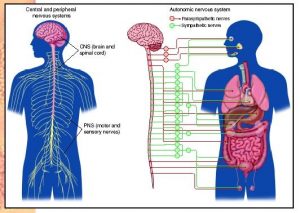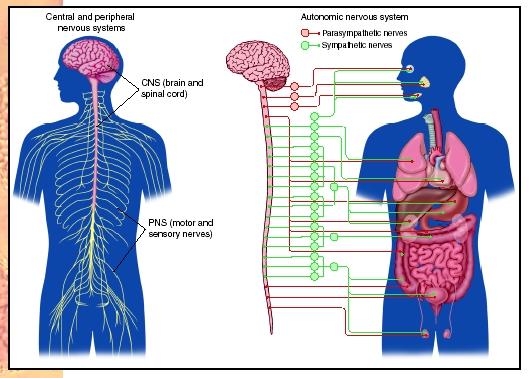Get out your anatomy and physiology books! (You don’t have to, but we are going to review the physiological implications of STRESS -Ugh, don’t you just hate that word? Alright, let’s get started; it’s more complicated than you’d [like to] think…)
Imagine, it’s been an awful week: It’s Monday. You’re not feeling well. Didn’t have breakfast. In a traffic jam. Late for work. Your boss has called; twice. The sirens of an ambulance? Gridlock. Where to pullover? Phone rings: you need to pick up your sick child. POW! Flat tire… Can you feel the stress mounting? Muscles tense, heart rate increases, breath tightens. This is the work of your autonomic nervous system.
 This branch of your nervous system helps to regulate internal organs and involuntary movement in the body. It is divided into two branches: the parasympathetic nervous system: controls the relaxation response, and the sympathetic nervous system: controls the fight or flight response. These branches operate complementary to one another attempting to maintain balance, keeping the body in metabolic equilibrium, or better known as homeostasis.
This branch of your nervous system helps to regulate internal organs and involuntary movement in the body. It is divided into two branches: the parasympathetic nervous system: controls the relaxation response, and the sympathetic nervous system: controls the fight or flight response. These branches operate complementary to one another attempting to maintain balance, keeping the body in metabolic equilibrium, or better known as homeostasis.
Usually when a stressful stimulus occurs, the body moves through the negative feedback loop and the two systems are able to bring balance to the body. However, with sustained stress the sympathetic nervous system is always “on”, never allowing the body to activate the parasympathetic nervous system, recover and relax. Exposure to sustained stress and time with the sympathetic nervous system “on” can lead to long-term health effects that prolong recovery time, or inflict irreparable damage via hormone imbalance.
When an individual is faced with a stressor a complex hormonal reaction occurs. First adrenaline is secreted. If the stressor(s) continue to be present cortisol is secreted; this prepares the body for fight or flight and triggers a number of internal reactions. Muscles are flooded with glucose, providing immediate energy supply; insulin production is halted encouraging the prompt use of glucose and preventing it form being stored; blood vessels narrow, heart rate increases, increasing blood pressure and forcing the heart to work harder.
Here is the turning point:
- If the stressor(s) is/are addressed and resolved, the parasympathetic nervous system will turn “on”, and hormone levels will return to normal and optimal bodily functions will resume.
- If the stressor(s) is/are not addressed and resolved the secretion of the stress hormone, cortisol, continues. Overtime cortisol adversely affects brain functioning, as it interferes with neurotransmitters. Since the “lines are down” this results in decreased learning and decreased ability to create new memories or recall old memories. The continued presence of cortisol interferes can lead to GI dysfunction, increased weight gain, chronic disease risk, and inflammation and decreased immunity. An increase in sleep disorders is also associated with elevated activity in the sympathetic nervous system, which only perpetuates the cycle and robs the body of the repair and healing that takes place during REM sleep cycles.
Stress is unavoidable, especially in our fast paced, ever-changing world. What is important is not trying to avoid stress, but to examine how we react to it. How do we avoid spurring ourselves into self-perpetuating stress cycles?
- Breath: The mechanical action of taking a big, deep breath will allow for increased oxygen to the brain and muscles. This will allow clearer thinking, and the muscles to relax. Also, a shift of focus away from the stressor to the breath will take you, momentarily, out of any negative thought loops and may allow for better perspective.
- Get out: Remove yourself, physically or mentally, from the stressor. Taking a few moments to center may allow for time to clear your head, take a few breaths and allow for a response rather than a reaction that may only increase stress levels.
- Exercise: Whether you are running 10 miles or relaxing in a long-held yoga pose, getting out of your head, remove you from the situation, get into your body, increase your breath and burn off some extra (nervous?) energy.
- Massage: Massage helps to turn “off” the sympathetic nervous system and turn “on” the parasympathetic nervous system. When the body is massaged blood and lymph circulation is increased moving vital nutrients and oxygen to through out the body to organs and muscles. Serotonin and endorphins essential for healthy mental functioning and decreasing depression and anxiety are secreted.
Stress affects everyone differently, and affects genders differently. To this I encourage you to listen to yourself, you will know when too much is too much. I hope understanding the silent affects of stress on your body encourages you to reevaluate how you handle stress. No matter which tools you decide to employ, at least you now have a few more.

